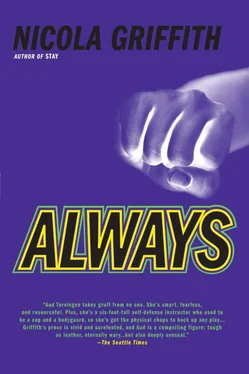“Busy,” I said. I wonder what their—my—burn rate was now.
“Extra money means extra crew. And not only can we afford decent food, people know it’s safe to eat. Kick’s rehired her assistant, but she can’t make it in until the afternoon, she said. So for now it’s coffee and premade sandwiches, and I’m it.”
“Where’s Anacortes?”
“Ah,” he said. “That’s where she’s hiding?”
“She’s not hiding.”
“No? Well, if you say so. Now, I know you’re not drinking milk, but have you tried soy?”
“No.”
“Let’s try it now, then. A nice soy latte.”
I watched him fuss with spigots. “Why do you think she’s hiding?”
“I imagine many things frighten her at the moment. No doubt she’ll get over it. And in answer to your question, I believe Anacortes is somewhere north, on the sound. Lovely views. Her parents, by all accounts, are not poor.”
“They’re not?”
“Not even remotely.”
“She said her father was ‘in trucking.’ ”
“And so he is. He’s the COO of a giant truck-making corporation. Here you go.” He handed me a paper cup. “Sorry it’s paper. There’s been a run on coffee this morning, and no time to wash cups.”
Drawn in the foam on top was a lopsided flower. Imperfect. Vulnerable. Ephemeral. “What’s she hiding from?”
He poured himself coffee from the urn and added two shots of espresso. “How long have you known her?”
“You know exactly how long.”
“That’s right. You barely know her, and she barely knows you. And she’s just been diagnosed with an incurable disease. If I were her, I’d be thinking you might cut and run. Most people would.”
Over by the scaffolding, one of the carpenters dropped a hammer and began to swear. Someone else was laughing.
“You never met my wife,” he said.
Deirdre, who had died at twenty-two of leukemia. He never liked to use the names of the dead.
“Illness isn’t like the movies. It’s not like Love Story. It’s not all off-screen treatments, or pale faces filmed through a Vaselined lens. It’s not crisp white sheets and brave smiles and poignant, self-sacrificing farewells. It’s messy and hard. Physically and emotionally.” He paused. “We’d known each other eighteen months, been married for six. I don’t know if, I don’t know if I would have, if she’d found out when I first met her, if—It might have been too hard.”
His eyes were hazed with memory, the way I imagined the blue glass of a doll’s eyes might look if had been left too long on the floor of an abandoned nursery, light streaming pitilessly through bare windows until the cheap glass clouded and cracked. Had he seen Kick’s illness right from the beginning and decided it was too hard?
“Are you going to drink that?” he said at last.
I put the coffee down. “I have to go.”
“Of course you do.”
“I have an investment to protect. There are lot of things to sort out. That article, for example, will make things worse, if anything, with OSHA and EPA.” With the violations a matter of very public record, the case-workers’ superiors would start asking public questions. I should have been able to give them a heads-up before it appeared. I should have been able to give Kick a heads-up. Don’t push me. I’m a cook.
"Invite them.”
I looked at him.
“The regulatory bigwigs. Everyone loves the movies. They’ll be putty in your hands.”
“That’s…”
“An excellent idea. I do have them sometimes. Yes. Now go.”
Outside, I was surprised to find it was raining.
ED THOMAS HARDY’ Soffice looked just the same, though this time the window was sheathed in fine silver droplets.
His shirtsleeves were rolled up and his tie loose, a pen in his hand. The epitome of a man of the people.
“As of half an hour ago, I have contracts for both of the private land parcels adjacent to mine,” I said. “The third, the federal land, might take a little longer.”
He nodded. “What do you know about federal, regional, and local tax incentives?”
“Nothing.”
“Well, I know a lot. And as well as owing you for your, ah, discretion, I know of several ways you could make a lot of people rich.”
“Profit isn’t my motive.”
“You’ve said that before. What do you want the land for, then?”
I imagined my land along the Duwamish, the river dimpled with rain. I saw a woman, sitting on a bench.
“What does the city need?”
“The city?” He gestured at the window. “Which city? The business city, the working people’s city, the city of coyotes and eagles and sword ferns?”
The woman had a fading black eye.
“Profit might not be your motive, but let’s pretend it is. Otherwise the people who can help or hinder you in this won’t trust you. So, what do you want to do with this land?”
The woman with the black eyes sat on the bench, watching a heron, and seeing the bird pluck its shining dinner from the river and take off into the grey sky hardened the amorphous hope under her breastbone to a burning point.
In Atlanta, I had taught ten women. Only one had been Sandra. I could do better next time.
“A foundation,” I said. “Classes. A park, a library.”
“Maybe some low-cost housing?”
“Explain.”
“Form a corporation—”
“I am a corporation.”
“Make a new one. Call it something attractive and well meaning, something stolid and impressive, that sounds semiofficial, like CharterMae Trust or Foundry House or—”
“You’ve thought about this before.”
He nodded. “I’ve thought about this a lot. There’s an ocean of money out there, washing from pocket to pocket. I’d like to see some of it get used. But to get it, you have to give something. Tax credits.” He looked pleased with himself.
“I’m none the wiser.”
“Private developers build affordable rental housing if they get tax breaks. The federal government alone hands out more than five billion dollars a year in credits to anyone who will keep rents low for fifteen to forty years, and rent to tenants who earn no more than sixty percent of the city’s median income. The state administers those credits. I know all the people down in Olympia.”
I waited.
“So what you do is build the housing, then sell the tax credits to syndicators, who bundle them and sell them to investors looking to offset their own taxes. Then you take that money from the sale, and use it to maintain your building. You mix luxury and affordable on an eighty-twenty ratio and you can sell tax-exempt bonds. You’ll make lots of money.”
“I don’t need to make lots of money.”
“The more you make, the more you’ll have to spread around to other people. And the ones you’ll be making the money off of are the rich people.”
“It sounds too good to be true. Why haven’t you already done this?”
“You need a lot of money to start with.”
“And you’d be willing to help shepherd this through the local regulatory process?”
“For a say in some of the community benefit.”
“It sounds… tangled.”
“That’s the price, sometimes.”
It would be Bette and Laurence who would work out the details. ETH would handle the work. I thought of those herons.
I need to do this myself, Kick had said. Not all women could. “My lawyer will call you.” I would also have to donate to his campaign. He couldn’t help me if he was no longer in office.
KICK CALLEDjust as I stepped into the rain.
“I’m back,” she said. “What’s left of my tree fell down.”
“Ah.” I stood very still while pedestrians parted grumpily around me and rain ran down the back of my neck.
Читать дальше












